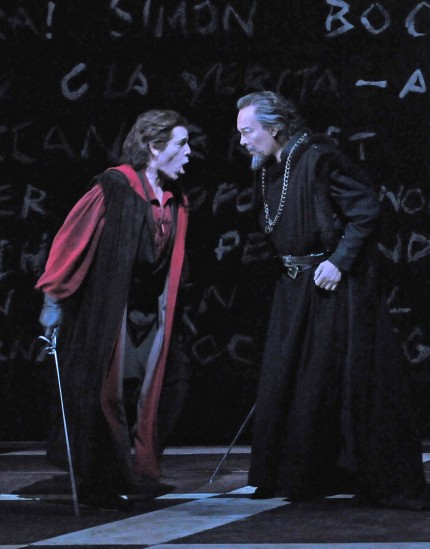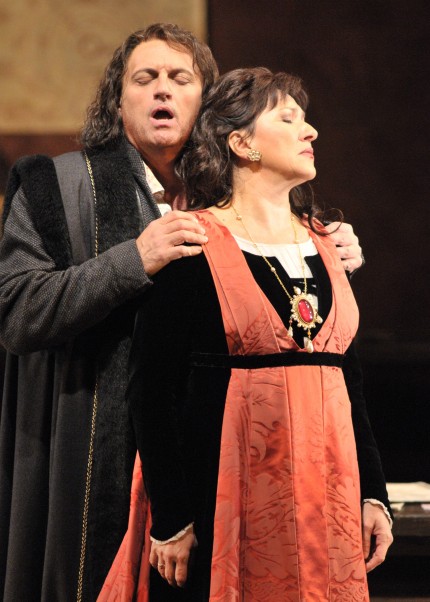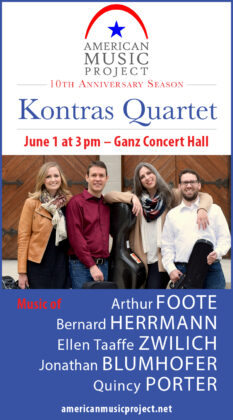Mystery thumps apart, a first-rate cast delivers a Verdian feast in Lyric’s “Simon Boccanegra”

As if the Doge of Genoa doesn’t have enough problems with ancient hatreds, political rivalries and court traitors, there was also that mysterious mechanical pounding to deal with.
The opening of Verdi’s Simon Boccanegra at the Lyric Opera was bedeviled throughout the entire performance Monday night by a loud repeated mechanical thumping that appeared to be coming from behind the right wall near the front of the Civic Opera House. A Lyric Opera spokeswoman on Tuesday said that the company still had no idea what the noise was or where it was coming from.
That distracting lapse apart, the Lyric had a fine night, securing an excellent cast of singers that delivered the vocal goods in Boccanegra, one of Verdi’s most intricately plotted works and an opera last heard at the company in 1995.
Even by middle-period Verdi standards, the Byzantine plot of Simon Boccanegra can be baffling. After an unsuccessful premiere, Verdi later revised the score, simplifying the storyline and it is that version that has found greater favor.
The scenario still remains daunting concerning the title 14th-century Doge of Genoa. A commoner with a checkered past, Boccanegra encounters political factions and ancient enemies and ultimately grows into a strong and just leader though he is ultimately undone and poisoned by his enemies. Boccanegra is not a repository of Verdi’s greatest hits, though there is a wealth of attractive music and opportunities for all four principals.
The well-intentioned Doge has become a favored character for Thomas Hampson and it is a role that is eminently well-suited for the American baritone at this stage of his career. Hampson was stretched by the role’s fitful high notes, but otherwise brought firmly focused and ardent vocalism in a well-rounded portrayal of the ruler more sinned against than sinning. Hampson’s dignified ruler encompassed the private father and public politician. He sang with heartfelt tenderness in a lovely rendering of the Act 1 duet with Amelia, Figlia! a tal nome io palpito, and brought strength and power to the council scenes. Hampson was at his finest in Act 3, conveying Boccanegra’s nostalgic regret and singing movingly in the final scene with deep feeling and emotional resonance.
Following up his memorable company debut as Boris Godunov last season, Ferruccio Furlanetto etched yet another incisive portrait as Boccanegra’s enemy, Fiesco. The Italian bass brought a natural ease of production, saturnine tone and glorious dark vocalism to the character. Fiesco could easily become just another Verdi bad-guy bass role, but Furlanetto brought a striking depth to the wealthy patrician, conveying the volatile anger, filial devotion and misplaced justice, particularly his forgiveness of Boccanegra in the final scene.

Krassimira Stoyanova made an almost pitch-perfect debut as Amelia. The Bulgarian soprano showed her Verdian bona fides memorably as Desdemona in last year’s concert performances of Otello with Riccardo Muti and the Chicago Symphony Orchestra.
Stoyanova’s flexible, gleaming instrument is eminently well suited to Verdi and the role of Amelia. She sang with glowing introspection in her opening aria, Come in quest’ora bruna and her penetrating top notes rang out with surprising strength in the ensembles. Dramatically, Stoyanova was serviceable if a bit generalized in her acting next to her male colleagues, relying too heavily on a few stock gestures.
As Gabriele Adorno, Boccanegra’s political rival who is in love with Amelia, Frank Loparado delivered his finest Chicago performance in several seasons. Lopardo was in superb voice throughout the evening, ardent, impassioned and Italianate, singing beautifully in his Act 2 aria and duets with Amelia.
Quinn Kelsey brought a booming baritone and impressive snarling nasty to Paolo, the villainous traitor.
The traditional 25-year-old Michael Yeargan–Elijah Moshinsky production from Covent Garden still looks handsome and works effectively aided by Peter J. Hall’s resplendent costumes, though Duane Schuler’s lighting at times was so dark, it was hard to tell what one was seeing.
Sir Andrew Davis was a generally reliable hand in the pit, though the Lyric Opera’s music director is less convincing in Verdi than in Mozart, Strauss or Britten. Some slow tempos drooped and tension sagged at times in the big ensembles. One couldn’t help thinking that if Renato Palumbo were in the pit we would be getting a more blazing and idiomatic rendition of this dark and fascinating score. The orchestra playing was fully committed, however, and the chorus sang with robust projection and polish under Martin Wright’s direction.
Simon Boccanegra runs through November 9. lyricopera.org; 312-332-2244.
Posted in Performances




